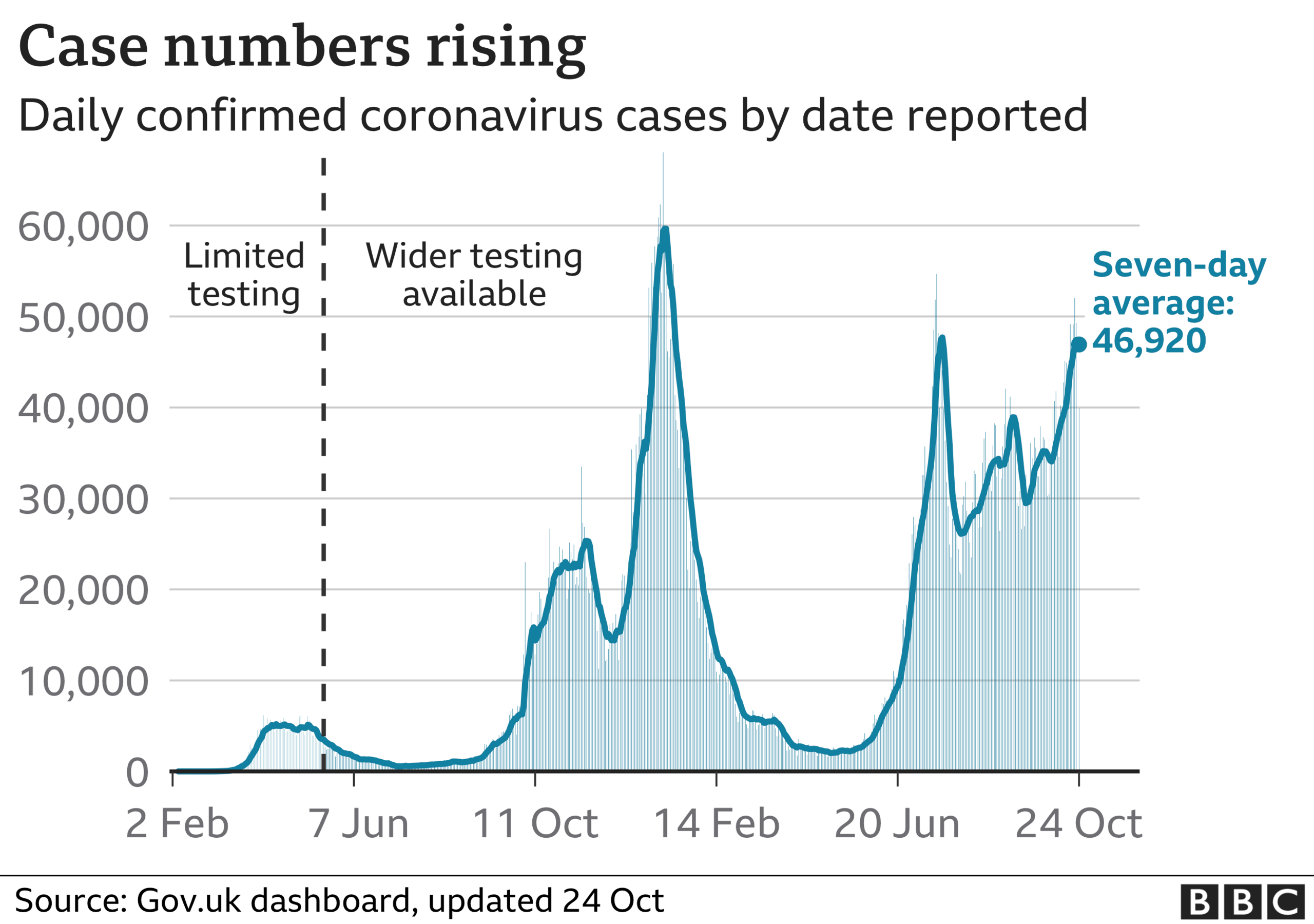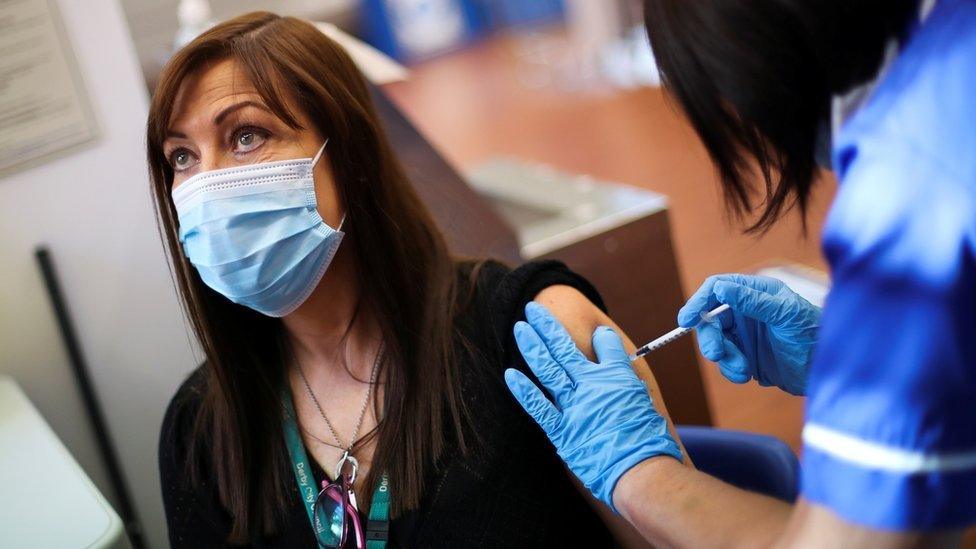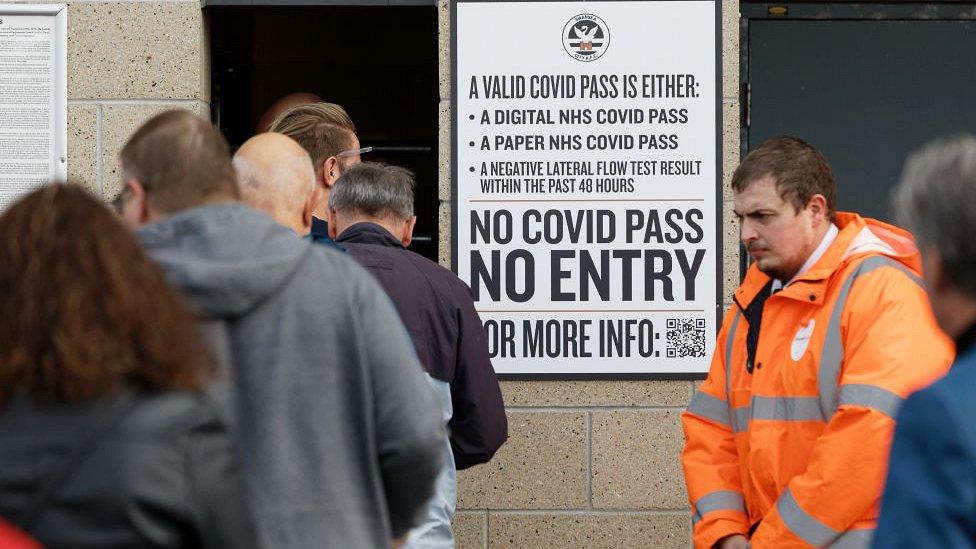Covid: Labour calls for Plan B measures in England
- Published
Rachel Reeves wants to see the government's Plan B implemented now, alongside Plan A
Labour is calling on the government to bring in its Plan B measures to tackle Covid in England, including advice to work from home and compulsory masks.
Shadow chancellor Rachel Reeves also told the BBC the vaccine programme was "stalling" and needed to work better.
But Chancellor Rishi Sunak said the data did not currently suggest "immediately moving to Plan B".
The measures, which aim to protect the NHS from "unsustainable pressure", also includes mandatory Covid passports.
Plan A, which is currently in place, involves offering booster jabs to the most vulnerable, a single dose to healthy 12 to 15-year-olds and encouraging unvaccinated people to get jabbed.
The NHS Confederation and the British Medical Association are among the groups who have called for some restrictions to be reintroduced in England, amid rising cases.
Meanwhile in Wales, ministers are to consider whether to extend the use of Covid passes for a wider range of venues.
Ms Reeves told BBC One's Andrew Marr Show: "I think the first thing is the government have got to do more to make Plan A work.
"If the scientists are saying work from home and masks, we should do that. So get A working better because the vaccination programme has been stalling, and introduce those parts of Plan B.
"But there are also things not in A or B that need to be done, like paying statutory sick pay from day one and also better ventilation in public spaces."
Asked whether Plan B should be introduced now, she said: "Yes, but let's not let the government off the hook with Plan A either."
A Conservative Party spokesman said it was the third time Labour had changed its position on Plan B in four days.


Appearing on the same programme, Mr Sunak was also asked whether it was time to bring in the government's back-up plan.
"We're monitoring everything, but at the moment the data does not suggest that we should be immediately moving to Plan B, but of course we will keep an eye on that and the plans are ready," he said.
The chancellor also said reintroducing the furlough scheme was "not on the cards because we don't envisage having to impose significant economic restrictions in the way that we had to over the last year".
He added that the vaccine rollout was the "first line of defence" and the booster campaign was the best way to protect people through the winter.
More than 325,000 booster jabs were given in England on Saturday - the biggest daily figure for boosters yet, NHS England chief executive Amanda Pritchard tweeted., external
Prof Adam Finn, a member of the government's Joint Committee on Vaccination and Immunisation (JCVI), said the vaccination programme by itself was not enough "to bring things under control".
"We do need to have people using lateral flow tests, avoiding contact with large numbers of people in enclosed spaces, using masks, all of those things now need to happen if we're going to stop this rise and get things under control soon enough to stop a real meltdown in the middle of the winter," he told Sky News' Trevor Phillips On Sunday.
Asked if the government should move to Plan B now, he said: "Well, some kind of Plan B."
The Liberal Democrats said it looked "increasingly likely" Covid restrictions would have to be reintroduced because of the "government's bungling and inaction".
Dr Katherine Henderson, president of the Royal College of Emergency Medicine, told the programme emergency departments were "already struggling to cope", with large queues of ambulances waiting outside hospitals.

Analysis
by Jim Reed, BBC health reporter
One in 55 people in England had Covid last week, according to the latest ONS figures, the highest rate since the end of January.
Demands for compulsory mask wearing, vaccine passports and more working from home have been growing - backed by many doctors and people representing NHS trusts.
Labour's position has not been altogether clear on this.
When asked by Andrew Marr whether Plan B should be introduced "now", shadow chancellor Rachel Reeves agreed. But she also suggested the priority should be accelerating the rollout of booster vaccines to the over-50s and first jabs to teenagers.
On the same programme, Chancellor Rishi Sunak repeatedly ruled out reimposing stricter measures "immediately" - perhaps suggesting a slight change of tone from senior ministers.
The key measure to watch for is pressure on hospitals.
As things stand, there are currently 6,405 people being treated for Covid on wards in England. The number has been rising but is still no higher than it was in mid-September - and well below the 34,000 seen in January.

In minutes of a meeting of the government's Scientific Advisory Group for Emergencies (Sage) on 14 October, which were published on Friday, the scientists said restrictions should be prepared for "rapid deployment" and that acting earlier could reduce the need for stricter measures over a longer time period.
They said that out of the government's back-up measures, advising people to work from home was likely to have the most impact on the spread of Covid.
Stricter rules are already in place in other parts of the UK, with masks compulsory in some settings in Scotland, Wales and Northern Ireland.

On Sunday, the UK reported 39,962 new cases - the first time in 12 days that cases have dropped below 40,000.
There were also another 72 deaths reported within 28 days of a positive test.
In other developments:
Former US Secretary of State Hillary Clinton told the BBC it was "imperative" Boris Johnson did what he could to stop rising Covid cases in the UK, as she called on the prime minister to introduce mandatory vaccines for places such as restaurants and offices
Parents are being urged to get their children vaccinated over the half-term break, with families now able to book appointments for 12 to 15-year-olds online at normal vaccination centres
New rules allowing fully vaccinated travellers returning to England to take lateral flow tests instead of more expensive PCR tests have come into force
Related topics
- Published20 October 2021

- Published1 July 2022

- Published2 April

- Published22 October 2021
